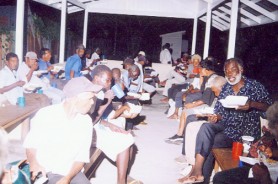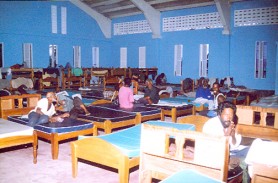Despite its name, the Night Shelter is a 24-hour refuge for those without any place to go, offering a roof over their heads, meals and other facilities not likely to be had on the harsh streets.

Harry Dat Tilku, the administrator of the Arapaima Street, East La Penitence facility, says it provides accommodation for about 200 persons, who have taken to the streets due to various circumstances, including broken homes, misfortune, illness or being unable to live with relatives for any number of reasons. However, once they can verify that they are homeless, they are welcomed by Tilku and his 22-member staff who attend to their needs.
The inhabitants of the shelter are provided with bed sheets, mosquito nets and personal toiletries. At present, of the total number of residents, 45 are females while males constitute the remainder. Twenty re-migrants also call the shelter their home.
Tilku explained that initially the facility was open only in the afternoons and persons would only spend the night, and then leave in the mornings. But after a review of the role of the facility, it was discovered that it did not make much sense to send the inhabitants back to the streets, since they would end up ‘liming’ there all day. Therefore a decision was made through the Ministry of Social Services, under whose purview the Shelter falls, to extend the hours to allow those who wanted to stay-in during the day to do so. While their movements are not restricted, under the rules at the shelter they must inform the staff before leaving the premises.
Since the shelter began offering a 24-hour service, Tilku said that the majority of residents prefer to stay-in during the day. Residents pass their time playing dominoes, cards, watching television or interacting with others there. A weekly church service is also held on-site and the majority of residents attend. However, other recreational activities are lacking and this is one of the shortcomings which Tilku identified but hopes to remedy in the future.
‘Empathy’

Staffers, including a social worker, have their hands filled performing as mediators when disputes occur between residents. They also ensure that medication is administered and they recommend the able-bodied for jobs. They must also be prepared to lend a sympathetic ear while seeing the residents with empathy. The on-site social worker provides counselling in substance abuse and conflict resolution, among other issues. “To date we have been able to find jobs for thirty- three persons,” said Tilku, who added that the residents are encouraged to save their money. While there is hope that these persons would be integrated into the society once again, he said that they are not forced to leave if they get a job. In fact, the only way a person may be evicted is for “extreme bad behaviour” such as fighting with staff and repeatedly breaking the rules.
Provision is made for the aged patients to be accommodated at the Palms. For the year, ten persons have been sent there while six more are awaiting accommodation. Minor medical cases are handled by the medex at the nearby La Penitence Health Centre while emergencies are forwarded to the Georgetown Hospital which also offers its ambulance services.
While measures are in place to curb disputes, there are times when conflicts arise between residents. In such cases, the staff would seek to resolve it but if the matter becomes serious, the case is referred to the police so that they may take appropriate action. Smoking and alcohol consumption are prohibited but Tilku acknowledged that there are cases where residents have been found with such items in their possession. These persons are usually disciplined but he pointed out that these items are sourced from outside the facility. He said that one of the challenges faced is trying to crack down on such habits. He related that there were other times when residents would return to the shelter intoxicated. In those cases, he said that they are not allowed entry until they would have become sober.
Tilku said that the shelter has benefitted from donations from various NGOs as well as from a number of persons. He noted that mainly clothing is donated and while the shelter is grateful he noted that the majority of the clothes are usually for females although male residents are the majority.
However, he said that they would be thankful for whatever help anyone may wish to render.
“What is really needed is for persons to reach out to the residents, have chats with them. To show them that they are still cared for and not given up on just because they are homeless,” said the administrator. Additionally, he said that there should be more attempts at removing other homeless persons from the streets. He added that the relevant authorities should take the situation of mentally-ill persons seriously since they need special care.
He identified the need for more space for housing and laundry services as the immediate needs of the facility. While a catering service provides their meals, he observed that the composition of the meals ought to be revised to cater for the nutritional needs of the residents.
The cost of running this facility is about $5M per month and Tilku noted that it provides a good service for persons who would otherwise be left to wander the streets. He believes that other such shelters should be set up in other parts of the country to help those who are unable to provide housing for themselves due to their circumstances.








